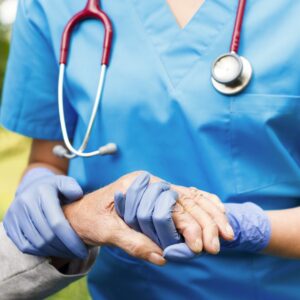
Whether you’re a veteran or novice travel nurse or allied health professional, preparing for the first day of a new healthcare assignment can be stressful. Not sure what you should bring along for your first shift? Here’s a handy guide on what to bring on the first day of a travel healthcare assignment to help you get ready for the big day.
Anything Your Recruiter or Facility Asked You to Bring
Before you start packing your bags, it’s a smart idea to re-read any communications you’ve had with your recruiter or facility to determine if they asked you to bring anything specific on your first day. Every facility is different—some may require you to bring medical supplies you may already own, for example—so check back through your emails and notes to make sure you have everything you need.
Medical Licenses
When you partner with us to find you a travel nursing or allied health assignment, our internal licensing and credentialing team will have already ensured you have the correct medical license for the state in which you’re working. Still, it’s important to bring a copy of any medical licenses in your name, just in case the facility you’re working at needs to make copies of it for its own records.
Certifications
You’ve worked hard for all the certifications you have, so make sure to pack some copies of these or proof of certification in your bag for the first day. The facility may not need them, but it’s always better to be safe than sorry. Here’s a few certifications to bring with you, if you have them:
- Basic Life Support (BLS)
- Advanced Cardiovascular Life Support (ACLS)
- Pediatric Advanced Life Support (PALS)
Government ID
Like any other job, it’s important to bring some form of identification to your first day on a new job. This can be a state issued driver’s license, your government issued passport, your social security card, or a combination of all three.
Vaccination and Health Records
When you work in healthcare, it’s important for you to bring copies of your health records, specifically your vaccination records, to your first day. Oftentimes, your facility will want to know that you’re up to date with all of your immunizations, especially as COVID-19 continues to spread.
Meals & Snacks
You don’t want to go hungry on your very first day, so pack a lunch (or breakfast, or dinner, depending on what time your shift is) so you can fuel up during your shift. In addition, think about bringing some snacks with you—you never know what the food situation is like at your new facility, so it’s important to be prepared for anything.
Stethoscope and Other Medical Equipment
Although this might seem like a no-brainer, it’s critical that you bring your stethoscope (if you have one and need it) to your very first day on the job. In addition, your facility may ask if you have any other medical equipment, such as an otoscope—if they do, and you have it, definitely make sure it’s in your bag.
Spare Change of Clothes
Even though you probably won’t need it, it’s a smart idea to bring an extra set of clothes (including scrubs) to your first day on a new travel nursing or allied health assignment.
A Can-Do Attitude
First impressions are everything, so make sure you bring a positive attitude to your very first day. Get enough sleep the day before and make sure you eat something substantial before you go into your shift—doing these basic things will set you up for success as you learn the ropes.
Find Your Next Travel Healthcare Assignment with BHS
Looking for your next travel adventure? We can help you with that! Check out our open jobs online and apply today—or reach out and we’ll connect you with your own personal recruiter who will find a travel nursing or allied health assignment that’s right for you.